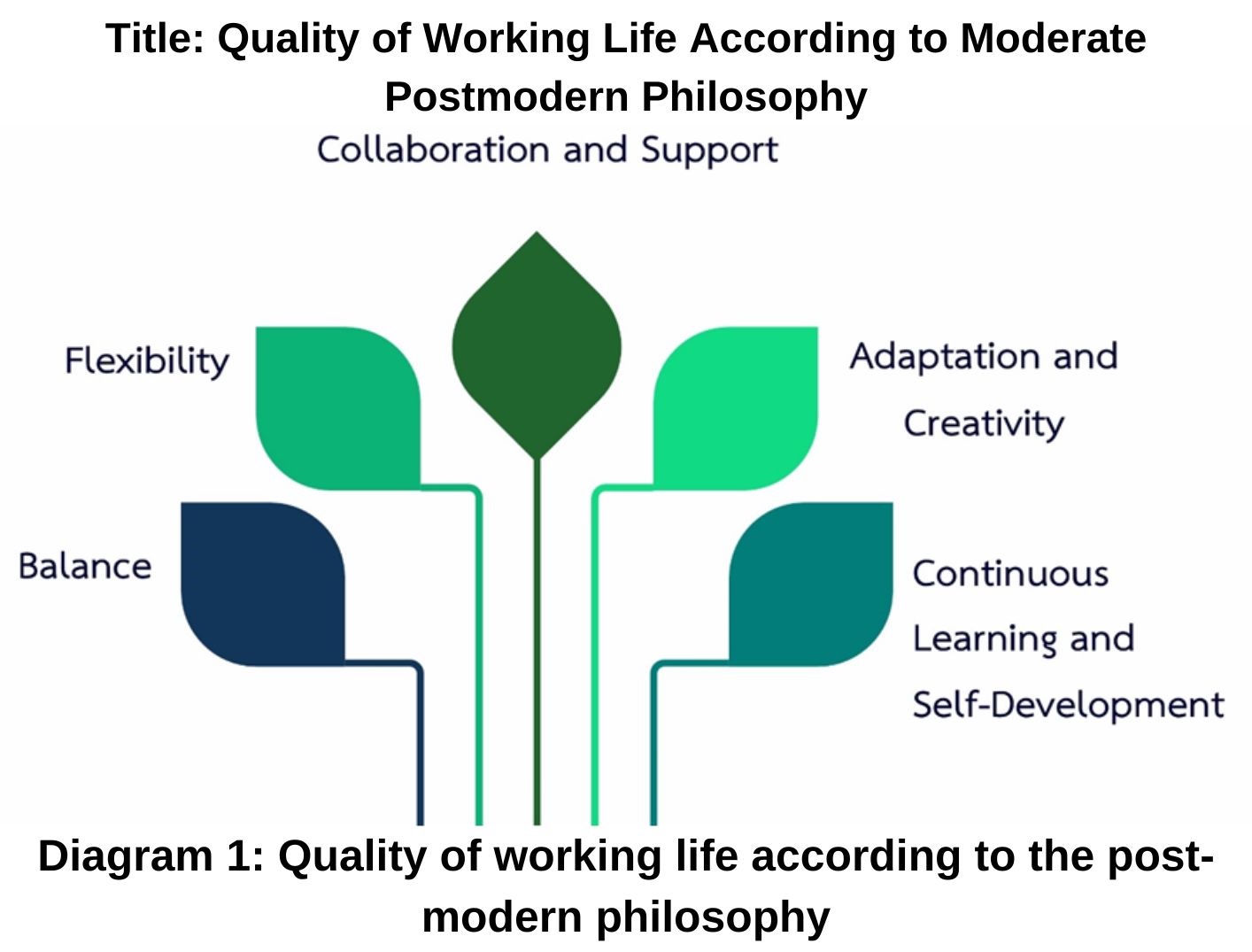Quality of Working Life According to Moderate Postmodern Philosophy
Keywords:
Quality of Life, Quality of Working Life, Moderate Postmodern PhilosophyAbstract
This research article was a qualitative study that used document analysis with the objective of analyzing quality of work life based on moderate postmodern philosophy. The study found that the development of quality of work life, according to this philosophy, was holistic and driven by four key powers: creativity, adaptivity, collaboration, and requisitivity. Development could be achieved through the following essential approaches : 1) Establishing Balance, 2) Flexibility, 3) Creating Collaboration and Support, 4) Adaptation and Creative Thinking and 5) Continuous Learning and Self-Development. Following these approaches could enable organizations and public sectors to foster a sustainable quality of work life. This approach aligned with the principles of moderate postmodern philosophy, which emphasized work that benefited employees and added value to the organization and society as a whole.
References
นวรัตน์ เพชรพรหม. (2562). วัฒนธรรมองค์กรและคุณภาพชีวิตในการทำงานที่ส่งผลต่อประสิทธิภาพในการปฏิบัติงานของพนักงาน บริษัท ไปรษณีย์ไทย จำกัด. การศึกษาค้นคว้าอิสระปริญญาบริหารธุรกิจมหาบัณฑิต. คณะบริหารธุรกิจ : มหาวิทยาลัยเทคโนโลยีราชมงคลธัญบุรี.
นิศาชล เรืองชู. (2557). คุณภาพชีวิตการทำงานที่มีความสัมพันธ์กับความภักดีในองค์กรของพนักงานธนาคารต่างชาติแห่งหนึ่งในประเทศไทย. สารนิพนธ์ปริญญาบริหารธุรกิจมหาบัณฑิต. บัณฑิตวิทยาลัย : มหาวิทยาลัยศรีนครินทรวิโรฒ.
มุสตอฟา หมัดบินเฮด. (2565). คุณภาพชีวิตในการทำงานที่ส่งผลต่อประสิทธิภาพในการปฏิบัติงานของบุคลากรภาครัฐ อำเภอบางแก้ว จังหวัดพัทลุง. สารนิพนธ์ปริญญารัฐประศาสนศาสตรมหาบัณฑิต. สาขารัฐประศาสนศาสตร์ : มหาวิทยาลัยสงขลานครินทร์.
เมธา หริมเทพาธิป. (2561). การมีส่วนร่วมในมุมมองหลังนวยุค. รมยสาร, 16(3), 63-77.
สัณหวัช วิชิตนนทการ และคณะ. (2562). ปัจจัยคุณภาพชีวิตการทำงานที่ส่งผลต่อความผูกพันต่อองค์การของครูในโรงเรียน สังกัดสำนักงานเขตพื้นที่การศึกษาประถมศึกษาอุดรธานี เขต 4. วารสารบัณฑิตวิจัย, 10(1), 169-188.
สิริณัฐ แสงดารา. (2561). ความสัมพันธ์ระหว่างคุณภาพชีวิตในการทำงานกับความผูกพันต่อองค์กรของบุคลากรสถานพินิจและคุ้มครองเด็กและเยาวชน กรุงเทพมหานคร. วิทยานิพนธ์บริหารธุรกิจมหาบัณฑิต. บัณฑิตวิทยาลัย : มหาวิทยาลัยศิลปากร.
Greenberg, J. and Baron, R.A. (1995). Behavior in organization : Under standing and managing the human side of work. 5th ed. New Jersey : A Simon and Schuster.
Gronroos, C. (2000). Employee management. Chichester : Goldberg.
Huse, E. F., & Cumming, T. (1995). Organization development and change. New York : West Publishing Company.
Mowday, R.T., L. W. Porter, and R. M. Steers. (1982), Employee-Organization Linkage : ThePsychology of Commitment, Abesenteeism, and Tumover. New York : Academic Press lnc.
Walton, R. E. (1973). Quality of Working Life : What is It?. Sloan Management Review, 15(1), 11-12.

Downloads
Published
How to Cite
Issue
Section
License
Copyright (c) 2024 Institute of Sufficiency Journal

This work is licensed under a Creative Commons Attribution-NonCommercial-NoDerivatives 4.0 International License.



